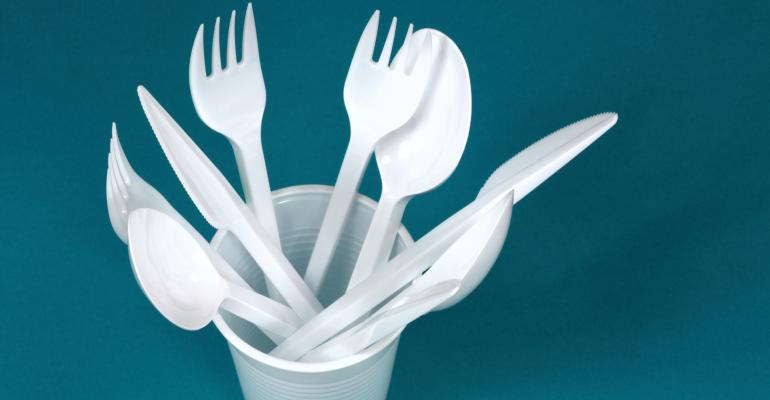Single-Use Plastic Bans Elsewhere Foreshadow US Future
Regulations against plastic packaging might be happening faster in other countries. But US companies need to be aware of implications here all the same.

The United Kingdom has made a massive step toward a sustainable future by banning single-use plastics for commercial and residential purposes. The ban officially took effect on October 1, 2023, marking the start of a new era in the global fight against climate change.
What does this ban mean for other countries, including the US, moving forward? What are the logistical challenges of eliminating single-use plastics? What are the expected long-term consequences? Business leaders need answers to these questions to make the right decisions about their operations.
Overview of the UK single-use plastic ban.
The Department for Environment, Food and Rural Affairs provided an effective summarization of the
new single-use plastic ban several months before it took effect. Starting October 2023, enterprises cannot offer or carry single-use plastic items in England. This ban applies to the following items:
• Online and over-the-counter items;
• Items from new and existing stock;
• Any single-use plastic, including recycled, compostable, and biodegradable;
• Products made partially or entirely from plastic, including lining or coating.
A handful of plastic items check all these boxes — bowls, trays, plates, balloon sticks, cutlery, and containers. However, the ban makes some exceptions. Plastic items supplied to another business or used for packaging are exempt. Food containers that require additional preparation before consumption are also exempt.
Companies are subject to random inspections and can face substantial fines for violating the ban. If they receive a fine, they can appeal it within 28 days. If the violation is confirmed, the business must cover the investigation costs.
The single-use plastics ban is the latest addition to the UK’s big-picture agenda to eliminate plastic waste and pollution by 2042. The government has already banned or restricted the use of other plastic items in recent years, including microbeads, plastic straws, stirring sticks, and cotton swabs. A future ban of all plastic items is also in the works, but the date isn’t official.
Along with the bans, the UK introduced the Plastic Packaging Tax in April 2022 to incentivize organizations to move away from plastic packaging. This tax applies to any business that uses plastic packaging materials containing less than 30% recycled plastic, whether the materials were manufactured in-house or imported from another source.
How the new legislation impacts businesses.
In the short term, this new legislation could have a negative financial impact on companies in the UK. Eliminating single-use plastics from daily operations would require them to seek alternative solutions and find new suppliers. They would also need to retrain employees who work with single-use plastics regularly.
"Although single-use plastics are still allowed for packaging purposes, the Plastic Packaging Act makes it impractical for most enterprises to rely on plastic as their main packaging material."
Although single-use plastics are still allowed for packaging purposes, the Plastic Packaging Act makes it impractical for most enterprises to rely on plastic as their main packaging material. Measuring, counting, reporting, and maintaining packaging records to ensure compliance also consumes more time and resources.
Additionally, some businesses were unaware of the ban and have made new orders for their usual plastic items. In response to these obstacles, the government has taken several steps to ease the UK’s transition to sustainable packaging. First of all, it doesn’t have to happen overnight. Organizations aren’t expected to change all of their packaging at once.
The government recommends ordering small samples of new packaging materials to determine compatibility with products and find the ideal sizes. Stress tests and customer surveys are two simple ways to obtain this information. From there, companies can adjust their prices based on the additional costs of acquiring the new materials.
Thanks in part to these initiatives, order volumes are decreasing and flexible packaging prices are falling across Europe to ease the transition. Film, foil, and paper prices are above the benchmark price range set in the final quarter of 2020, but they’re still more affordable for small businesses than they were at the start of 2023.
Plastic restrictions in other countries.
The UK single-use plastic ban is one of many similar restrictions enacted by other countries. Starting in July 2021, the European Union passed an almost identical ban on the whole continent, restricting the use of
10 particular plastic items that were contributing the most to plastic waste pollution:
• Balloons and balloon sticks;
• Cutlery, plates, stirrers, and straws;
• Cups;
• Food containers;
• Beverage containers;
• Cigarette butts;
• Plastic bags;
• Packets and wrappers;
• Wet wipes;
• Cotton buds.
Meanwhile, in the United States, American lawmakers have not yet placed a federal ban on single-use plastics. However, California, Connecticut, Delaware, Hawaii, Maine, New York, Oregon, and Vermont have all banned plastic shopping bags. The US Department of the Interior wants to phase out single-use plastics from public lands by 2032.
For now, initiatives to reduce plastic waste are largely at the local and state levels. Small-scale changes will give businesses more time to find cost-effective alternatives and help consumers adjust their buying habits. As Europe and the UK make progress, other countries should follow suit with their own plastic bans.
Change will be slow, but steady.
Based on the results of previous plastic bans and the concerns about the UK’s new single-use plastic ban, it’s clear that change will be slow. The global economy can’t abandon plastic items and packaging materials overnight.
However, the change will also be steady. There will be a growing number of restrictions on plastic use in the 2030s, 2040s, and beyond. Business leaders of today must plan accordingly by starting the transition to non-plastics now and staying ahead of the curve.
About the Author(s)
You May Also Like




